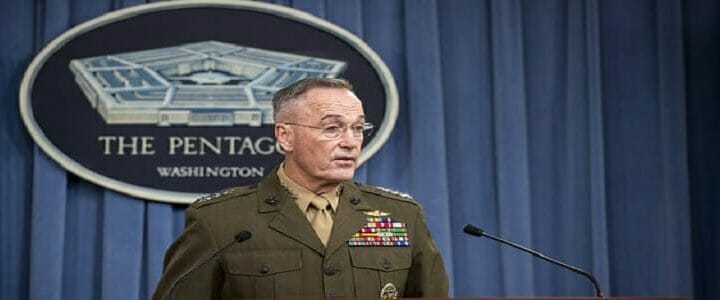On Thursday afternoon, the Department of Defense released the findings of a U.S. Africa Command investigation into the October, 2017 ambush that killed four American special operators and four of their host-nation counterparts in the central African nation of Niger. Prior to the events of October 4, most American civilians were unaware that the U.S. had deployed troops to Niger.
After the news of the casualties spread, Trump critics tried to turn the incident into “Trump’s Benghazi.” At the fore of this movement was Rep. Frederica Wilson, the Florida Democratic congresswoman who represents the district where one victim, Sgt. LaDavid Johnson, grew up. Johnson had even participated in Wilson’s “5000 Role Models” youth mentorship program. But as I suspected in October, the facts don’t bear this out.
Still not Benghazi
The investigation, led by Maj. Gen. Roger L. Cloutier Jr., the AFRICOM chief of staff, is going to disappoint these who thought they’d find some kind of inherently systemic malfeasance they could hang around the president’s neck. The investigators’ summary report concluded that the soldiers’ deaths were the result of “individual, organizational, and institutional failures and deficiencies,” but that the losses were not the result of a “single failure or deficiency.”
There were no delays in sending help, nor any denials of support. Units from the French and Nigerien militaries reacted quickly and were delayed only by the distances involved and the nature of the rough terrain in southwestern Niger.
The investigation’s most damning finding is one that has plagued military operations at every level for as long as there have been armies: the numbing way sustained combat operations turn extraordinary activities into routine chores.
The military uses the term concepts of operations, or CONOPS, in several ways. The Pentagon defines a CONOP as a “verbal or graphic statement that clearly and concisely expresses what the commander intends to accomplish and how it will be done using available resources.”
This can take the form of everything from the grand, overarching ideas about how the military will integrate major weapons systems into current doctrine, to the day-to-day planning for unit-level operations. For small units, the term has largely replaced the use of operations orders, which are much more detailed documents that result from a deliberate planing process using “MDMP,” the military decision making process.
The “conop” problem
The report concluded that the team’s development of these plans had become marked by a “lack of attention to detail in quality control and quality assurance.” In other words, these missions had become so routine that the commander of the Special Forces Operational Detachment Alpha, or ODA, was just gong through the motions. The report accuses the unnamed captain from the 3rd Special Forces Group of recycling information from previous mission plans.
This is hardly surprising. As a two-star general in the early days or World War II, Dwight D. Eisenhower headed the Army’s War Plans Division, which is called the “Eisenhower Division” to this day. Shaped by this experience, Ike publicly repeated an old Army phrase, “plans are useless, but planning is everything.”
But in situations like the one the ODA found themselves in, there are two main factors that affect the quality of planning. The first is that unlike an operations order, which has a doctrinal, five-paragraph format (situation, mission, execution, service and supply, and command and signal), there is no universal format for a CONOP. The contents and format vary from unit to unit, making them inherently inconsistent.
The second factor is that when a small unit like a 12-man ODA conducts independent operations far from its support structure (the ODA was based out of Oullam; its next higher headquarters was about 50 miles away in the capital of Niamey), shortcuts are inevitable. A high operational tempo, combined with little help to complete the “administrivia” that is endemic to modern military life, means that repetitive missions are treated as routine. Planning is reduced to a minimum to ensure the unit has the “gas, beans, and bullets” necessary to conduct the next day’s mission.
We’re too risk-averse
Furthermore, the report concluded that “Contradictory and ambiguous CONOPS approval matrices” between Special Operations Command Africa in Stuttgart, Germany, Special Operations Command Forward — North and West Africa in Baumholder, Germany, the Special Operations Command and Control Element in N’Djamena, Chad, and the Advanced Operating Base in Niamey, meant that commanders were misinformed as to who actually had approval authority for different types of missions.
The commander at the AOB in Niamey (filling a role normally filled by major) approved this particular mission, but in reality the authority lay with the lieutenant colonel in Chad. Because of this, Marine Gen. Thomas D. Waldhauser, commander of AFRICOM, “directed a comprehensive review of the concept of operations process used by the special operations component.”
While this will help, it is not a panacea. What is most required is an admission that military operations, especially ones involving forward-deployed special operations forces, are inherently risky. No amount of planning or rehearsal can change the fact that sometimes, soldiers die. In the words of Robert E. Lee, “To be a good soldier, you must love the army. To be a good commander, you must be willing to order the death of the thing you love.”
That warrior spirit is completely at odds with the DOD’s modern risk-averse nature. Soldiers die. We ought not grow used to that, but we do have to accept it as the price of victory.



